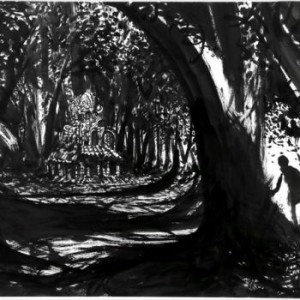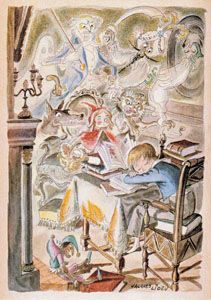Playing in Inkwood

Into Inkwood
I was twenty, and it was somewhere round three o’clock in the morning. I sat at a battered desk in the corner of the bedroom in my basement apartment in Montreal. The floor was warped from one of the unending water leaks in the ancient plumbing and the desk wobbled. Charlie Mingus’s music played from a small radio. The shelf above the desk was stuffed with books and paper, pens, a empty glass, an overflowing ashtray, and a plate covered in toast crumbs. The air smelled of damp and cigarettes, and ever so slightly of drains. I was hunched over a notebook, pen scribbling furiously. I was writing about a man on a bridge on a foggy night, waiting for a woman to appear from the other side. He didn’t know if she would come and if she didn’t he didn’t know if he’d go after her because the bridge, once crossed, disappeared forever, exiling everything on the other side to the mists of memory. My body was heating up with creative energy. I had to pause, pen between my teeth, and take my sweater off. I had to slow down, or else I wouldn’t be able to read back what I wrote tomorrow. And then, I knew what would happen next. I laughed out loud. I kept scribbling.
I was a file clerk in the Registration Office of Concordia University in those days and I had to be at work at nine, which meant, even if I went to bed right then, and fell asleep instantly (which I never do), I’d only get four hours sleep. But I wasn’t going to bed. While some of my friends might still be out at the clubs, I was partying in my own way…I was writing, careless of tomorrow’s exhaustion, pallor and dark under-eye circles.
Looking back on it now, I realize I wasn’t just writing, I was playing. I made up worlds, moving my characters around the way I used to move my dolls as a child. I dashed into the woods of my wild mind, and to hell with a breadcrumb trail. I dove into the wave of words and came up laughing.
That went on for a long time. (Well, until the booze, which had once given me wings, took away the sky…but that’s another story.) And then I started publishing.
 Look, don’t get me wrong. I am grateful to be a 4-time published author, stunned with gratitude, in fact, since like most writers, I suffer from a lot of self-doubt. Still, before I started publishing I was writing as an innocent, unaware of how damaging publishing can be to the writer’s soul. I had no critics. I had no agents or editors hovering over me with sharp red pens. I had only my own imagination and my dreams.
Look, don’t get me wrong. I am grateful to be a 4-time published author, stunned with gratitude, in fact, since like most writers, I suffer from a lot of self-doubt. Still, before I started publishing I was writing as an innocent, unaware of how damaging publishing can be to the writer’s soul. I had no critics. I had no agents or editors hovering over me with sharp red pens. I had only my own imagination and my dreams.
Now, I know how much rejection can burn; I know how precarious the approval of publishers can be — based as it is these days almost solely on sales, and not on things like the quality of the work, or even good reviews. I know, too, that the approval of others can be addictive, and not in a good way (so few addictions ever are). If you liked that, the insecure part of my mind says, then I’ll try and do it again…do you like me now? Now?
In fact, although writing is always a psychologically risky business (since we go down into the murky, mucky morass at the bottom of the subconscious), like those annoying teenage vampires so popular right now, publishing can sink its fangs into you and suck out all the life. Which may be why so few writers publish a second book — having run the gauntlet once, they realize they don’t want to run it again. Consider what Anne Lamott said in an address to a writing conference:
I always end up feeling guilty at writing conferences because I know that mostly the participants will not get published, and no one seems to be willing to tell them this. I have heard that 1 percent of writers at these conferences ever get a book published. One percent!
Also, they believe that if they do get published, a wonderful new life is in store. It will turn out that deep down they are really valuable people and will have lots of money from now on and really cool people like Ethan Hawke will be dropping by all the time. But it’s a lie. Being a published writer will make them long to be ONLY as mentally ill as they are now. Their current level of obsession and doubt and self-loathing will look like the good old days. Honest.

Portrait of the writer as a grown up
And so, what’s the remedy to the Catch-22 of the working writer’s life? We all want readers, yes? But in order to be the kind of writers who are readable, prolific and sane, we need to encourage not our marketing and self-promotion skills, but our joy of writing. We need to keep in touch with the ‘play’ of writing and creativity, we need to lock the editors/agents/critics/marketing departments out of our creative spaces and delight in the joy of creating-without-expectation.
Whereas we know it’s important to become proficient at our craft so we can effectively communicate our literary intentions to the reader, we also need to create in a environment free of the emotional, psychic toxicity of the publishing business world.
The more we try and please someone other than our own inner voice, the less authentic our work will be, and therefore — in that circular way of things — the less readable. So, forget the ‘industry’ for a while. Remember what it felt like to write for the sheer joy of it. Try writing a fairy tale, or take a fairy tale you know and rewrite it using a modern-day setting. Try some magic realism like Ben Okri or Gabriel Garcia Marquez. Pay attention to your dreams and base a short story on one of them — use a dream setting, or write about a recurring dream figure.
Who knows where in the wild wood you might travel, when there’s no one saying you shouldn’t go there?
Let me know how you keep the ‘play’ alive in your work, won’t you?
Actually…one of the things that makes writing fun for me
is the prospect of messing with other people’s heads. I like
the problem-solving of “How can I make the other person to
feel the way I want them to, just using words of my choice?”
or “How can I make them laugh?” There is nothing I like better
than to watch people’s first reaction to my work, because then
I know if it’s working or not. (Of course it’s not fun when it’s not
working, but I guess the reactions to the things that do work make
up for the rest. And then I know what to fix.)
I think protection from isolation and rejection is one of the great
benefits of working with a supportive writing group. It is wonderful
to have a bunch of people who *will* read your work thoughtfully,
and spend the time to understand its merits and improve it, regardless
of the whims of publishing. It definitely helps keep me out of the
looney bin.
Spoken as a person who has yet to complete a work of fiction worth
publishing.
A great point, Dawn, and that’s why I’m so excited about the “Sharpening the Quill” group. It’s a wonderful way not only to develop our craft, but to find support and, as you say, keep us out of the nut house! 😉